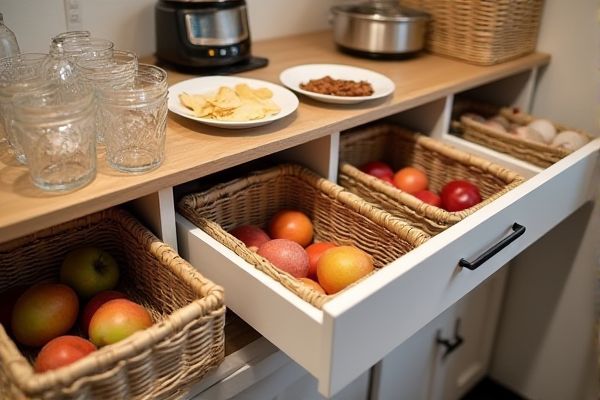
Basket drawers in a pantry offer open, ventilated storage ideal for fresh produce and bulky items, while tray drawers provide flat, stable surfaces perfect for organizing smaller containers and spices. Discover which option best suits Your pantry needs by exploring the detailed comparison in this article.
Table of Comparison
| Feature | Basket Drawer | Tray Drawer (Pantry) |
|---|---|---|
| Storage Type | Open wire baskets for ventilated storage | Flat, solid trays for organized stacking |
| Best Use | Produce, bulky items, easy access | Spices, canned goods, boxed items |
| Visibility | High visibility due to open design | Moderate; items stacked and layered |
| Airflow | Excellent ventilation | Limited airflow |
| Durability | Durable metal construction | Typically wood or laminate trays |
| Cleaning | Easy to clean; removable baskets | Requires wiping; less removable parts |
| Installation | Requires specific slides for baskets | Standard drawer slides compatible |
| Cost | Generally higher due to hardware | Usually more affordable |
Introduction: Understanding Pantry Storage Solutions
Basket drawers offer breathable storage perfect for fruits and vegetables, reducing moisture buildup and extending freshness. Tray drawers provide a flat, stable surface ideal for organizing canned goods, spices, and small kitchen tools efficiently. Choosing between a basket drawer or tray drawer depends on your pantry needs and how you prefer to access Your stored items.
Basket Drawers vs Tray Drawers: Key Differences
Basket drawers provide ventilation and easy visibility, making them ideal for storing fruits, vegetables, and pantry items that benefit from airflow. Tray drawers feature a flat, solid base designed for organizing smaller, loose items and spices, enhancing accessibility and preventing items from tipping over. Your choice depends on whether you prioritize breathability and visibility or structured organization within your pantry space.
Space Efficiency: Which Maximizes Your Pantry?
Basket drawers provide superior space efficiency for pantry organization by allowing flexible storage of irregularly shaped items and maximizing vertical space through stackable designs. Tray drawers, while offering easy item visibility and access, often limit storage capacity due to fixed compartments and shallower depths. Choosing basket drawers enhances overall pantry capacity and adaptability, optimizing storage in compact or densely packed spaces.
Accessibility and Convenience for Everyday Use
Basket drawers offer open-weave designs that enhance visibility and airflow, making it easier to access fresh produce or pantry staples quickly. Tray drawers provide a flat, solid surface ideal for organizing smaller items or containers, ensuring your pantry stays tidy and items won't tip over during retrieval. Choosing between them depends on your need for easy access to bulkier goods with basket drawers or neat, stable storage with tray drawers for everyday convenience.
Organization Capabilities: Customizing Your Pantry
Basket drawers offer flexible organization capabilities, allowing you to store bulky or irregularly shaped items with ease, while tray drawers provide segmented compartments perfect for sorting smaller pantry essentials like spices and snacks. Customizing your pantry with a combination of both basket and tray drawers enhances accessibility and maximizes storage efficiency tailored to your unique needs. You can optimize your space by selecting the right drawer type to keep your pantry orderly and functional.
Material and Durability Considerations
Basket drawers typically feature metal or wire construction, offering superior ventilation and resistance to moisture, making them ideal for storing fresh produce in a pantry. Tray drawers are often made from solid wood, plastic, or composite materials, providing a stable and flat surface suited for organizing canned goods and packaged items. Durability varies with material choice: metal basket drawers resist bending and corrosion, while tray drawers require sturdy, well-finished materials to prevent warping and damage from spills.
Cleaning and Maintenance Requirements
Basket drawers in pantries often require more frequent cleaning due to their wire or mesh construction, which can accumulate dust, crumbs, and spills more easily than solid surfaces. Tray drawers, with their flat, smooth surfaces, simplify cleaning and maintenance by allowing quick wiping with a damp cloth, reducing buildup of debris and moisture. Both types benefit from regular inspection to prevent mold or rust, but tray drawers generally offer easier upkeep in high-humidity pantry environments.
Cost Comparison: Budgeting for Your Pantry
Basket drawers typically offer a more affordable option for pantry organization, with prices ranging from $30 to $100 depending on size and material quality. Tray drawers, often constructed with solid wood or metal frames, usually cost between $80 and $200, reflecting their durable design and smooth sliding mechanisms. When budgeting for a pantry, basket drawers are ideal for cost-conscious shoppers seeking lightweight storage, while tray drawers provide a longer-lasting investment with enhanced accessibility.
Aesthetic Appeal: Matching Your Kitchen Style
Basket drawers offer a rustic, woven texture that adds warmth and a natural element to kitchen designs, ideal for farmhouse or traditional styles. Tray drawers provide a sleek, flat surface that complements modern, minimalist kitchens with clean lines and streamlined aesthetics. Choosing between basket and tray drawers depends on whether you prefer organic texture or smooth, contemporary finishes to match your kitchen's overall style.
Which One Should You Choose for Your Pantry?
Basket drawers offer excellent ventilation and visibility, making them ideal for storing fresh produce and bulky items in your pantry. Tray drawers provide a flat, stable surface perfect for organizing smaller containers, cans, and spices efficiently. Your choice depends on whether you prioritize airflow and accessibility with basket drawers or a neat, compartmentalized space with tray drawers.
 homyna.com
homyna.com